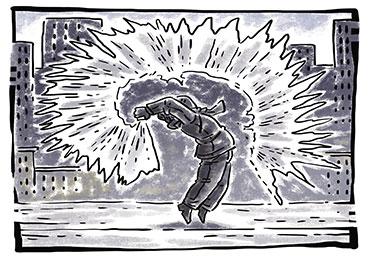t’s been really cold lately in Beijing. So cold that when temperatures turned relatively normal for the time of year - hovering just either side of 0 C, it felt positively balmy, warm enough to sit outside and sip a coffee.
The first thing I knew about the extreme cold wave was when a food delivery app sent me a text message, urging its patrons to keep safe. “We would like to warmly recommend you to keep warm,” it said. I didn’t know if this message was intended to encourage us to stay inside and order takeout, thus exposing its poor delivery drivers to the extreme cold, or urge us not to order so its drivers would be safer.
How cold can it get, I thought? Just before New Year’s Eve, temperatures had plunged for a couple of days to what seemed extremely cold - around -13 C and a “real feel” of -22 C, caused by bone-chilling winds. Online that day, people were delighted to find that apparently, Beijing was colder than the Arctic. It was record-breaking cold, and a weather station in the mountainous county of Yanqing to the northwest of Beijing recorded temperatures of -26 C, breaking a 42-year record.
Until the following week. On January 7, temperatures plunged to the lowest the capital had seen for some 60 years. In the evening, as I swathed myself in scarves and hats to take my dogs out, the weather app said it was -19 C, with a real feel of -37 C. Winds were gusting from 30-50 kilometers per hour. I was in genuine fear that I had inflicted frost bite on myself after having to take my gloves off for a few seconds to scoop the pooches’ poop.
It was so cold, some online influencers tried to do that trick where you flung hot water over your head and watched it freeze before it hit the ground. They must not have realized that in such strong winds, there was a real possibility it would blow right back at them, something doctors in North America warned people about as there was a strong possibility of facial burns.
My apartment is already freezing, despite the 24/7 central heating we have, provided for the winter from November 15 to March 15. My previous apartment was so hot in winter, due to unlagged pipes running under the floor, that people thought I’d installed underfloor heating. I had to switch the radiators off at the wall. This one is designed so wackily that all the rooms have external walls, jutting out from the building. It means the heating is woefully bad. I often use an extra heater or the air con set to the highest heat setting just to feel comfortable.
That day, not even that was enough, so I thought I’d go to a nearby cafe to work, where the heating is usually good. Not many people were brave (or stupid enough) to go out. Inside the cafe, the temperature could best be described as brisk. But I’d ordered food and drinks, so I had to stay.
There are many habits of Beijingers that I find endearing. Need to pop to the store on a hot summer night? Wear pajamas - why bother dressing for discomfort. Dance on the street to weird techno music? Go for it. Some are mildly annoying - that way the neighbors have of being nosy about your business under the guise of common greetings. Others are just downright enervating - the fact that some people are quite unable to stop spitting on the street, despite the continuing threat of a deadly virus.
But the one that really makes me mad, especially in winter, is the seeming inability to close a door. There are summer door failures also, but it’s not so bad when it’s just hot air.
When I first came to Beijing, more than two decades ago, many buildings like malls, restaurants and offices still had door persons. I always thought these were just make-work jobs, like the elderly ladies who used to sit in the elevator all day to push the buttons. This caused any person I knew who lived in these high-rises to rush home before midnight as if they would turn into a pumpkin. My friend’s building management worried that elderly residents would not be able to push their own buttons, which is why this situation lingered on until at least the early 2010s.
Meanwhile, in the cafe, the temperature took a turn for the even more frigid. I asked the staff why it was so cold. They shrugged, saying the mall was in charge of heating. Then I realized. People were still not bothering to close the door. On this day. Only a thin plastic layer was between us and temperatures like the top of Mount Qomolangma (Everest) in summer, which averages -19 C (in winter, it’s -36 C, although of course it gets way colder). I admitted defeat and swapped one cold location for another, my apartment.
And I am starting to change my mind about the need for people to open doors. By definition, they would also be closers.

 Old Version
Old Version